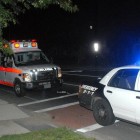
Apr 13, 2017
I am happy to share with everyone that Mr. Bendel has seen and read the post from earlier this week. I look forward to speaking with him in the future. The issue with BLS care in New Jersey has never and will never be about passion. It’s about training. Every good EMT needs to possess a balance of passion, compassion, medical knowledge, and the ability to apply that knowledge. I am happy to say that I come from a family that possesses those values. I have two parents who both had lengthy careers as volunteer EMTs. After reading my letter to Mr. Bendel, my mom, Karen Kier, decided to share some of her thoughts about what it means to be a small town EMT. What you will read below are her thoughts, from the heart. Mr. Bendel and MedicSBK: First off, EMS is one of the defining aspects of my life. To go one step further, EMS in Island Heights (where you both either currently or have formerly resided) creates this passion. It’s a passion both for the profession and for the people I so dearly cared for during my 22-year career as an EMT on the Island Heights First Aid Squad. MedicSBK, you, above all, should know this about me. I watched you closely (and protectively at first) as your skills developed – and then we switched roles. I knew that you were bound for great things – and I proudly watched you fly. I have performed CPR (successfully) on a dear friend, the parents of friends, people I have known and not known . . . and watched others drift away after a devastating stroke. I have simply and quietly held many hands. Was it hard? Yes. But it would have been harder not to have been there. I like to believe that with few exceptions I brought this same compassion to all of my calls, whether in Island Heights or in one of our neighboring communities. In my own simple, naïve way I can only hope that this is something that permeates the entire profession. For personal reasons I have made the decision not to renew my EMT certification –...



